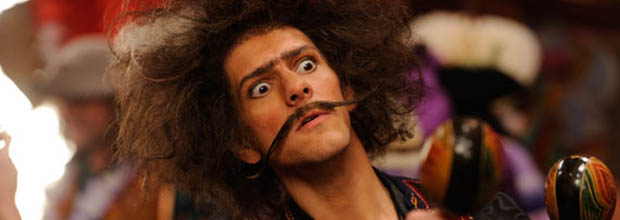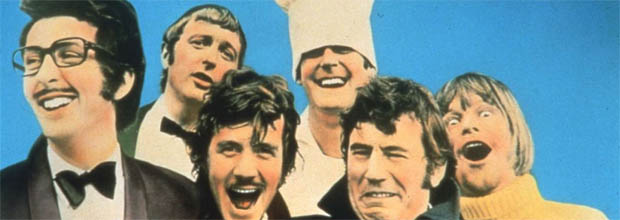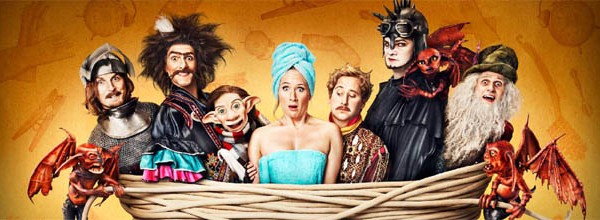From the writing and acting team behind Horrible Histories, the eight-part series follows 33-year old mum Debbie Maddox (Martha Howe-Douglas) who is bored of being an unappreciated stay-at-home mum. Little does she know this is all about to change when she unexpectedly finds herself on a quest through Yonderland, with only an Elf by her side. This extraordinary world is only accessible via her kitchen cupboard that is inhabited by a collection of eccentric (and usually idiotic) characters, some of whom happen to be puppets.
> Buy Series 1 on DVD on Amazon.
How did the writing process work across the series?
Ben Willbond: “This is an incredibly collaborative process. We all sit round the table and come up with the storylines and characters, and as we go off and write individual episodes more comes out, and yet more comes out when we’re on set together.
“Obviously we have the completed episodes but there’s always more we can do…we’re always trying to find more…and that’s a good habit that’s developed as a group, which is why we’re so desperate to keep working together.”
Simon Farnaby: “We just all get together and really just brainstorm ideas, just try to get as many ideas as we can. I think we had loads, y’know, twenty odd ideas for episodes. We would just pick one, if we had a feeling for it, and we had a grasp of the story and how it would work. The Wizard, Bradley, for instance, was one of my ideas so I just said ‘I’d love to write that,’ and, y’know, did.
“So we once have the episodes allocated we all just work through the storylines and everyone chips in with jokes and funny scenarios, then we whittle it down to a storyline, then we go away and write it, and then read it, come up with more jokes, hone it…so at every stage all of us are involved basically.”
 It must be nice having that safety net…
It must be nice having that safety net…
Simon Farnaby: “There were loads of times I would just go ‘I don’t know how this bit goes’ or ‘What’s the story leap?’ Always, you get five or six ideas and we just pick the best one. It’s good, we’ve worked together for a long time and we all really get on, so it’s quite a lot of freedom.
“No-one’s afraid of coming up with a bad idea – which happens often – and the key is no-one’s embarrassed by a bad idea (I come up with them all the time!), it’s really just throwing as many ideas out as you can. When you’re writing you always remember…say Jim came up with a line, you can go ‘Ah! Jim came up with that line…’”
Simon, do you hope to be added to the great pantheon of screen villains? Are you going for scary at any point?
Simon Farnaby: “What I tried to do was just play Negatus as bad, as villainous as I can, and naturally, somehow, that just ends up being funny…so he’s certainly a comedy villain but I watched a lot of films with famous villains in them and tried to add something different to the canon.
“With Negatus what you see with him is the mechanisms…as a baddie you’ve got to have a bad guy’s furnace; he’s got to throw enemies in, but he has to get it built. So you see him with his…furnace-fitter. You see a lot of the more mundane issues…he’s always got accountancy problems, he’s got a budget to play with…a recession villain…so you get to see a side you don’t always to see of a villain. You don’t get to see Bowie in Labyrinth doing the accounts.
“Lex Luther’s a good one, Gene Hackman’s version. He’s good because he’s quite funny and playful. The one in Thor, Thor’s brother… and I loved what they did with the villain in Iron Man 3.”
“Cumberbatch is pretty good in Star Trek Into Darkness. He’s a good one to see work… he went down a few octaves… went very kind of low… down there.

How did the show develop? At what point did puppets come on board?
Ben Willbond: “I think it was a sort of collective idea, elements from everyone really. There was the kind of feeling when we were doing HH that we wanted to stay together…as a team, as it were…and so we started to bounce a few ideas around. I’d had a feature idea with Matt.
“We’d thought to ourselves wouldn’t it be nice to go back to the sort of fantasy films we enjoyed – Labyrinth, Dark Crystal – that had a sort of low-fi effects, puppets, flights of fantasy. We put that to the group, met up with Working Title, and the idea just grew from that. That was the consensus, and it allowed us to do what we enjoy: multi-character comedy. In a fantasy world you can do pretty much anything you want. It pretty much snowballed from there really.
“We sort of worked out the stories then…we figured out…we knew the elf was always going to be a puppet, but from there we wrote it and started to figure out what other characters would be puppets – usually they’re incidental characters – and we sort of broke it down like that.
“It became quite obvious quite quickly what would be fun to have as puppet characters or recurring characters. Some of them – like the demons – are in every episode, they’re always there, so it was a nice mix. But yeah, always, right from the beginning, we knew it had to be populated with puppets.”
Can you tell us more about your Shakespeare film?
Ben Willbond: “That’s really exciting. That’s going into pre-production. Larry and I wrote that script with everyone in mind, being a multi-character film… yeah, we’re all set to go. We spent two-and-a-half/three years working on the script and getting funding, so it’s been a long journey. That’s going to be great, that’s going to be really cool.”

How do you feel about comparisons with Monty Python?
Ben Willbond: “We were just aware things were working nicely doing HH. That’s kind of rare. That’s a cast project – we all auditioned for it – and that’s down to Caroline Norris. She did a fantastic job, she knows how to cast comedy. The fact that we all work together on and off the screen means we can take this on an inevitably you get compared to people who’ve come before but our main concern is just to keep going to as long as we can.
“It is such a precious thing, there’s lots of sketch groups that I knew growing up, going to Edinburgh, tried desperately to get people to give them money to make shows and it never happened. Suddenly we’ve found ourselves in the incredibly lucky position of being put together and it’s lovely working with everybody, so it’s just one of those things.”
Dan, you’re playing Debbie’s husband Peter, what’s he like?
Dan Skinner: “He’s a family man, husband, father of two kids, Estate Agent. He’s got a lot on his plates, he likes to go to work, he’s trying to get into the local amateur dramatics club. He’s slightly oblivious to what’s going on in Debbie’s life, although they love each other very much. They’re a happy couple.”
So, is he more of a straight man?
Dan Skinner: “He’s more lacking in self-awareness. It’s what you might consider a straight role in that a lot of characters in the show are larger than life, fantasy characters and I basically play a bloke in a suit. In that respect, yeah, you could say he’s a straight man, but he’s got his own quirks, his own way. There’s something about him, not just a boring fella.
“He’s grounded, we wanted to make Debbie and Pete’s relationship accessible and real so people had something to relate to, so that when she went through to Yonderland they cared about her, they knew where she’d come from, y’know?”
And if she doesn’t come back…
Dan Skinner: “Yeah, she’s got to come back for the kids and her husband, so she’s pulled between the two worlds.”
> Buy Series 1 on DVD on Amazon.
What did you think of Series 1? Let us know below…

